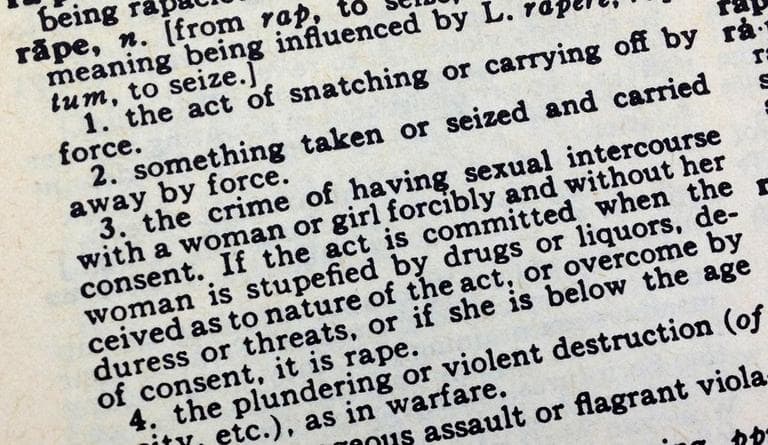Advertisement
How Should State Laws Define Rape?
Resume
Warning: This piece contains descriptions of rape and sexual assault.
The legal definition of rape varies greatly across the U.S. Those differences can result in lower sentences for offenders and a more complicated healing process for survivors.
Much of the variation stems from a legal movement aimed at creating new definitions for the criminal acts considered to be rape, in the hopes that it would make them more quantifiable in court cases.
Twenty-five states don't use the word rape at all in their definitions, including Michigan, which was the first state to remove the word "rape" from its laws in 1975.
"...for me as a survivor, the semantics of this and calling rape ‘rape’ is huge in how I move on and how I go forward.
Lydia Cuomo, rape survivor
From the 1920s up until last year, the FBI's definition of rape - which it uses for the collection of crime statistics - was “the carnal knowledge of a female, forcibly and against her will."
The new definition put in place last year takes into consideration oral and anal penetration, allows for both women and men to be victims as well as perpetrators and does not require that that force be used against the victim. This is because many victims submit in fear of retaliation from their attacker for fighting back.
One case in New York has sparked a legislative movement to change the way the state defines rape.
Late last summer, Lydia Cuomo (no relation to the governor), was orally, anally and vaginally penetrated by off-duty police officer Michael Pena.

A jury found him guilty of the oral and anal contact, but not of the vaginal penetration. These specifics make a difference because in New York, only vaginal penetration is considered rape. Oral and anal penetration are considered a criminal sexual act. Pena later admitted to the vaginal penetration.
Lydia Cuomo is now working to get a bill passed in the New York legislature that would include oral, anal and vaginal contact in the definition of rape.
However, critics have expressed concern that including all of those acts under the definition of rape would make it harder to charge perpetrators with multiple counts of the crime.
Cuomo says even though it's a definition, it matters to victims.
At an Albany press conference earlier this month she said, "You know, we don’t use precise terms. No one likes saying 'oral' and 'anal.' No one likes talking about it. But when you do use precise terms, it gives a lot of power. I do think it is semantics, but semantics are important. I think for me as a survivor, the semantics of this and calling rape 'rape' is huge in how I move on and how I go forward."
Stephanie Hughes has written about the legal definition of rape for Salon, and told Here & Now's Robin Young that Cuomo is brave to be so public about her rape.
"She's really claiming this incident," Hughes said. "She feels incredibly passionate about it. She feels it's important for people to speak out."
- Do you think New York should change its legal definition of rape?Let us know on our Facebook page.
Guest:
- Stephanie Hughes, freelance writer for Salon and producer for Maryland Morning with Sheilah Kast. She tweets @stephanie_h.
This segment aired on February 20, 2013.